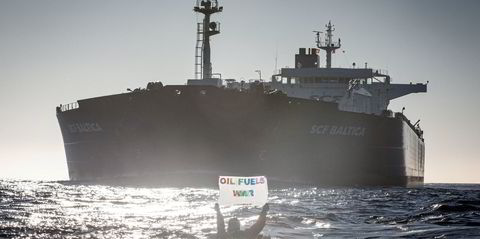Weak tanker markets in the first quarter caused Overseas Shipholding Group (OSG) to record to its biggest quarterly loss since 2016.
The New York-listed crude and product tanker owner recorded a net loss of $15.9m for the first three months of 2021, equivalent to a loss of $0.18 per share.
The US-flag specialist booked $25.1m in profit for the same period last year, although this result included a $19.2m gain related to the acquisition of the Alaska Tanker Co.
But unlike early 2020, tanker markets have been unusually weak this year so far and freight rates for crude vessels have even slipped into negative territory.
Shipping revenues fell year on year by 20% to $81.3m during the first quarter.
Time-charter equivalent revenue totalled $65.5m, down 32.5% compared with the first quarter of 2020.
The last time Florida-based OSG posted such a significant quarterly loss was in the third quarter of 2016, when it booked a $98.7m deficit.
The company spun off its international business, New York-listed International Seaways, in November of that year.
Liquidity moves
This prompted OSG to take steps to free up additional liquidity by selling its 50,300-dwt product tanker Overseas Gulf Coast (built 2019) for $32.5m.
But the sale of the unencumbered asset resulted in a $5.4m loss in OSG's first-quarter results.
The weak tanker market has also resulted in OSG laying up vessels, according to the firm's first-quarter report.
"Heightened uncertainty has resulted in the non-renewal of charters for tankers. In response to this we have placed six conventional tankers and one of our lightering ATBs [articulated tug barges] in lay-up as of March 31," said Sam Norton, OSG president and chief executive.
OSG also had one vessel unemployed in the spot market for two months during the three-month period.
In March, the shipowner tweaked its financing agreements with lenders on six loans, including one from Prudential due in two years.
Norton said global and national energy markets continued to be impacted "severely" during the first quarter by pandemic lockdowns, business closures and travel restrictions, which hit demand for seaborne transport of crude oil and refined products.
But he added that OSG's results met its expectations and "point to the continuing benefit of having a diversified asset portfolio".
"Although our conventional Jones Act tankers experienced losses in the first quarter, our other operating assets performed largely in line with historical norms," he said.
As well as the pandemic's impact on demand, the tanker market was also affected by Winter Storm Uri during the first quarter, OSG noted.
The storm resulted in US refinery shutdowns, which further reduced the already low demand for tankers.
Outlook
But Norton said that OSG hopes that the global roll-out of Covid-19 vaccinations will normalise demand for marine transportation and allow its laid-up vessels to be reactivated.
"We anticipate that, as vaccine distribution continues to expand and there is a continued lifting of Covid-19 restrictions, mobility and related US consumption of transportation fuels will normalize to fuel demand patterns consistent with historic levels of consumption," he said.







